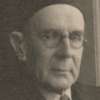Burning at first no doubt would be worse,
But time the impression would soften,
While those who are bored with praising the Lord,
Would be more bored with praising him often.G. Lowes Dickinson (1862-1932) British political scientist and philosopher [Goldsworthy "Goldie" Lowes Dickinson]
“Burning at First”
I'm unable to find a good source of this, other than a quotation in "A Fanfare for Prometheus," a speech by Learned Hand, American Jewish Committee, New York City (1955-01-29); the speech (with poem) was entered into the Congressional Record (1955-02-09) by Sen. Herbert Lehman of New York.
Quotations by:
Dickinson, Lowes
A war which is destroying men as they have never been destroyed before, from which at the best the nations will emerge permanently degraded in their stock, poorer in physique, duller in intelligence, weaker in will than they went in, this war is to be protracted until the whole manhood of Europe is decimated, in order — in order to what? Let us ask in detail.
In order, we are told, that the Germans may ‘feel they are beaten.’ And then? They will be good in future? They will admit they were wrong? They will lick the hand that chastised them? Who believes it? The more completely they are beaten, the more obstinately they will be set on recovery. When France was beaten to the dust in 1870, did she repent for having provoked the war? On the contrary, she gathered up her forces for revenge. And Germany will do the same.G. Lowes Dickinson (1862-1932) British political scientist and philosopher [Goldsworthy "Goldie" Lowes Dickinson]
“The War and the Way Out: A Further Consideration,” sec. 2, Atlantic Monthly (Apr 1915)
(Source)
Nationality is a Janus, facing both ways. So far as it stands for the right of a people to govern itself, it stands for freedom. So far as it stands for the ambition to govern other people, or to destroy them, or to shape them into an alien world, it stands for domination. Throughout history it has stood for both.
G. Lowes Dickinson (1862-1932) British political scientist and philosopher [Goldsworthy "Goldie" Lowes Dickinson]
“The War and the Way Out: A Further Consideration,” sec. 3, Atlantic Monthly (1915-04)
(Source)
The task of war is to destroy life; the task of peace is to create it; to organize labor so that it shall not incapacitate men for leisure; to establish justice as a foundation for personality; to unfold in men the capacity for noble joy and profound sorrow; to liberate them for the passion of love, the perception of beauty, the contemplation of truth. Of all these things war is the enemy.
G. Lowes Dickinson (1862-1932) British political scientist and philosopher [Goldsworthy "Goldie" Lowes Dickinson]
“The War and the Way Out: A Further Consideration,” sec. 3, Atlantic Monthly (1915-04)
(Source)
History may be used to support any conclusion, according to the emphasis of our conscious or unconscious principle of selection.
G. Lowes Dickinson (1862-1932) British political scientist and philosopher [Goldsworthy "Goldie" Lowes Dickinson]
Religion: A Criticism and a Forecast, ch. 1 “Ecclesiasticism” (1906)
(Source)
What we commonly have in our mind when we speak of religion is a definite set of doctrines, of a more or less metaphysical character, formulated in a creed and supported by an organization distinct from the state. And the first thing we have to learn about the religion of the Greeks is that it included nothing of the kind. There was no church, there was no creed, there were no articles. Priests there were, but they were merely public officials, appointed to perform certain religious rites. The distinction between cleric and layman, as we know it, did not exist; the distinction between poetry and dogma did not exist; and whatever the religion of the Greeks may have been, one thing at any rate is clear, that it was something very different from all that we are in the habit of associating with the world.
G. Lowes Dickinson (1862-1932) British political scientist and philosopher [Goldsworthy "Goldie" Lowes Dickinson]
The Greek View of Life, ch. 1 “Religion,” sec. 1 (1911)
(Source)
Dissatisfaction with the world in which we live and determination to realize one that shall be better, are the prevailing characteristics of the modern spirit.
G. Lowes Dickinson (1862-1932) British political scientist and philosopher [Goldsworthy "Goldie" Lowes Dickinson]
The Greek View of Life, ch. 5 “Conclusion” (1911)
(Source)

